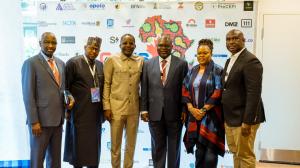FirstBank Champions Inclusive Fintech Innovation at Canada-Africa Fintech Summit (CAFS 2025)
FirstBank reaffirms its 131-year legacy by championing fintech innovation and inclusion at the Canada-Africa Fintech Summit 2025 in Toronto
As a legacy institution with over 131 years of leadership in financial services, FirstBank's sponsorship highlights its commitment to fostering cross-border collaboration, financial inclusion, and forward-thinking innovation in the global fintech landscape. Olayinka Ijabiyi, Ag. Group Head, Marketing and Corporate Communications, stated, “Our support of CAFS 2025 reflects our belief that collaboration between African and Canadian fintech ecosystems can lead to transformative innovations. FirstBank is proud to help shape that future.”
During a high-level panel discussion with Rudy Cuzzeto, MPP for Mississauga–Lakeshore, and David Stevenson, Country Director for the United Nations World Food Programme (Nigeria), Chuma Ezirim, Group Executive for E-Business & Retail Products at FirstBank, stressed the significance of digital collaboration in Africa’s financial ecosystem.
“We’re building APIs that understand regulatory bifurcation, who has access to what, and why. The technology is the easy part. The real challenge lies in maintaining security, consent, and performance is where the heavy lifting lies,” he explained. “In Nigeria, fintech has evolved beyond disruption to convergence, integrating banks, fintechs, and regulators into an agile and accountable ecosystem.”
He further emphasized that regulatory clarity is essential for building public trust and attracting private investment in fintech, stating, “The more we collaborate, the more lessons we learn, and the greater the benefits for consumers.”
In a separate panel discussion, Rachel Adeshina, Chief Technology Officer at FirstBank, shared insights on harnessing AI to enhance credit access for the underbanked alongside Dr. Ebenezer Onyeagwu, former Group CEO of FirstBank.
“We’re addressing data poverty by using AI to interpret alternative data, allowing us to lend to individuals who might otherwise be invisible to the traditional credit system,” she noted. Adeshina highlighted that FirstBank has disbursed over ₦1 trillion in digital loans through this AI-driven model, achieving a remarkable repayment rate of over 99%.
“This innovation was enabled not only by technology but also by a supportive environment, including API banking regulations, data privacy laws, and a shift from account-based to wallet-based banking,” she added. She also underscored the importance of scalability through collaboration, stating, “In a fragmented continent like Africa, digital scale will come from interoperability. Connecting the 54 markets is the next big challenge, and fintechs are ideally positioned to lead that initiative.”
The summit is part of Canada’s broader Africa Strategy, aimed at fostering economic partnerships, digital cooperation, and innovation exchange. As Africa’s digital finance ecosystem continues to grow and Canada develops its own open banking framework, events like CAFS 2025 provide a timely platform to align strategies and ignite collaborations.
“There are significant opportunities in cross-border payments, credit access, and infrastructure scalability,” Ezirim remarked. “To unlock them, we must design business models that reflect the realities of both regions.”
About FirstBank of Nigeria
Founded in 1894, FirstBank of Nigeria is one of Africa's most enduring and respected financial institutions. With a strong emphasis on digital transformation, financial access, and cross-border innovation, the bank is a key player in shaping the future of banking in Africa and beyond.
Media Contact:
Olayinka Ijabiyi
Ag. Group Head, Marketing and Corporate Communications
FirstBank of Nigeria Limited
Esther Ijewere
Rubies Media Group
+1 437-255-7007
email us here
Visit us on social media:
LinkedIn
Instagram
Facebook
YouTube
TikTok
X
Legal Disclaimer:
EIN Presswire provides this news content "as is" without warranty of any kind. We do not accept any responsibility or liability for the accuracy, content, images, videos, licenses, completeness, legality, or reliability of the information contained in this article. If you have any complaints or copyright issues related to this article, kindly contact the author above.
Wiser Rentals Brings AI-Powered, Transparent Car Rentals to Memphis
Bangga Main Lokal: Kolaborasi Lintas Industri Inisiasi UniPin yang Didukung oleh EKRAF
International Prog Collective Ferkaad To Release Debut Album 'A Different Kind Of Animosity' October 31st, 2025
Więcej ważnych informacji
 Jedynka Newserii
Jedynka Newserii

 Jedynka Newserii
Jedynka Newserii

Handel

Mercosur to tylko wierzchołek góry lodowej. UE ma ponad 40 umów handlowych, które mogą destabilizować rynek rolny
Umowa handlowa między UE a krajami Mercosur może znacząco zaburzyć konkurencję na rynku rolnym i osłabić pozycję unijnych, w tym polskich, producentów – ostrzegają rolnicy i producenci żywności. Umowie sprzeciwia się część krajów unijnych, które domagają się klauzuli ochronnych oraz limitów importowych. – Problemem jest jednak nie tylko ta konkretna umowa. Chodzi o cały system wolnego handlu, który się kumuluje z dziesiątek innych porozumień – podkreśla Andrzej Gantner, wiceprezes Polskiej Federacji Producentów Żywności.
Firma
Dzięki zdalnej weryfikacji tożsamości z wykorzystaniem AI firmy zminimalizowały liczbę oszustw. Rozwiązania wykorzystuje głównie sektor finansowy

Z najnowszych danych Eurostatu wynika, że w 2024 roku 5,9 proc. polskich firm korzystało z rozwiązań z zakresu sztucznej inteligencji. W 2023 roku był to odsetek na poziomie 3,67 proc. Wciąż jednak jest to wynik poniżej średniej unijnej, która wyniosła 13,48 proc. Jednym z obszarów, który cieszy się coraz większym zainteresowaniem wśród przedsiębiorców, jest weryfikacja tożsamości przez AI, zwłaszcza w takich branżach jak bankowość, ubezpieczenia czy turystyka. Jej zastosowanie ma na celu głównie przeciwdziałać oszustwom i spełniać wymogi regulacyjne.
Prawo
Daniel Obajtek: Własne wydobycie i operacyjne magazyny to filary bezpieczeństwa. Zgoda na magazyny gazu poza krajem to rezygnacja z suwerenności energetycznej

Były prezes Orlenu ostrzega przed zmianami w ustawie o zapasach ropy naftowej, produktów naftowych i gazu ziemnego. Jego zdaniem przygotowana przez rząd nowelizacja tzw. ustawy magazynowej i ujednolicanie unijnej polityki energetycznej to zagrożenie dla bezpieczeństwa energetycznego Polski. W jego opinii tylko silna spółka narodowa, własne wydobycie, krajowe magazyny i zbilansowany miks energetyczny zapewnią Polsce bezpieczeństwo i konkurencyjność.
Partner serwisu
Szkolenia

Akademia Newserii
Akademia Newserii to projekt, w ramach którego najlepsi polscy dziennikarze biznesowi, giełdowi oraz lifestylowi, a także szkoleniowcy z wieloletnim doświadczeniem dzielą się swoją wiedzą nt. pracy z mediami.






![Nestlé w Polsce podsumowuje wpływ na krajową gospodarkę. Firma wygenerowała 0,6 proc. polskiego PKB [DEPESZA]](https://www.newseria.pl/files/1097841585/fabryka-nesquik_1,w_85,r_png,_small.png)



.gif)



